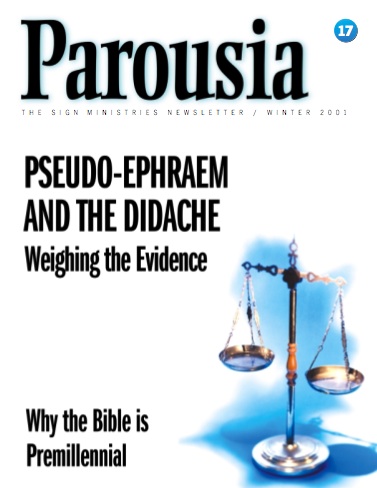Foolishness: “I consider debating to be a total waste of time.”
Wisdom: “The first to state his case seems right, until his opponent begins to cross-examine him.” Proverbs 18:17
If the two-page, surface-level, inaccurate article that Reagan wrote against Pre-wrath recently is any reflection of what his competency would be like in a debate, it is understandable why he refused. As we learned this past week, David Reagan has rebuffed my offer to have meaningful interaction in a public format. He considers this interaction “a total waste of time.” He is wrong, and every truth-lover should be offended by such a claim.
Debate is simply an orderly exchange of ideas in which each person receives the same fair amount of time to present their case. It includes meaningful interaction in cross-examination in which theological positions are held accountable; i.e., assumptions, inconsistencies, and false claims cannot go unchallenged as they often do in print. There is only one conclusion that someone must come to if they think that this meaningful interaction is a waste of time: They want their assertions to be immune from examination. They do not want to be seriously challenged.
The most effective format for two individuals with opposing views is not behind a keyboard or a book, but a public debate each having the same amount of time periods of an opening, rebuttals, cross-examination, and closing. And you cannot have a real debate without cross-examination; it is the soul of the debate. Otherwise, all you will really have is two monologues, not a dialogue. Further, the moderator is very important to a debate in managing and enforcing the protocol. If a debate functions as such, I believe that God’s people are edified by witnessing a genuine engagement and accountability between theological perspectives. And most of all, God is glorified in this effective manner of communication that seeks after Biblical truth.

Charles Cooper tells about his journey to the prewrath position. He also explains how the contradictions in the pretribulational system prompted him to examine Scripture more closely on the rapture question. This presentation was given last October in O’Fallon Missouri at an eschatology forum.
Download as MP3
[Update on the Debate]
In this article, pretribulational teacher David R. Reagan facilely describes the prewrath rapture, which was not all together accurate. He responds to the Prewrath rapture by attempting to refute the Prewrath rapture interpretation that the seals are not God’s wrath. Further, he does not recognize the Biblical distinction between the Antichrist’s Great Tribulation and the Day of the Lord’s wrath.
David Reagan, like so many other pretribulational teachers, accepts the common flaws of his system without being seriously challenged. Accordingly, I challenge Dr. Reagan to a public moderated debate with copious amounts of cross-examination. He has made claims against the Prewrath view that are demonstrably false. I am challenging him to defend those claims in public, in a debate. I am willing to defend the Prewrath position under cross-examination by Reagan. Is he willing to do the same with his own convictions?
Given that pretribulationism is losing numerous adherents every year to the prewrath side, I would think that pretrib teachers would jump at the chance to debate a prewrather in public and show for everyone, once and for all, why prewrath is wrong. Oddly, this does not happen. Why am I doing this? It is not like David Reagan has anything to lose since it is pretribbers coming over to the Prewrath side. The reason is that I am confident that when Pretribulationism and Prewrath have the opportunity to be set side by side, most people will see the truthfulness in the Prewrath position, not pretribulationism. Why do you think that in the past 20 years, pretribbers are so averse to have their position examined publicly by a prewrather?
I believe that this debate would be beneficial for God’s people since two theological positions are held accountable; i.e., assumptions and false claims cannot go unchallenged as they often do in print.
“The first to state his case seems right, until his opponent begins to cross-examine him.” Proverbs 18:17
The Teaching of the Early Church On the Second Coming of Christ
Guest Article by Gary Vaterlaus
Many claims have been made by pretribulationists that the early Church believed that Christ would come before the events of the 70th Week of Daniel begin–that is, before the period of tribulation. Dwight D. Pentecost in his book Things to Come uses selected quotes from some of the early church fathers to try to show that they believed in the imminent return of Christ (see pp. 168-169).
More recently, Grant R. Jeffrey in his book Apocalypse: The Coming Judgement of the Nations devotes the entire Appendix to references to early church writings, some which he claims show that they held to an “any moment,” imminent coming of the Lord.
I believe that we should let the Church fathers speak for themselves. Below are lengthy quotes from 12 documents of the early Church fathers from the first four centuries showing that they believed that the Church would be present on the earth during the Great Tribulation of Antichrist. From my review of the early Church writings I would agree with Robert Gundry’s assessment that “…the early Church did not hold to the doctrine of imminence. The very passages cited for imminence (by the pretribulationists) reveal a belief that the Church will pass through the tribulation.” (Robert Gundry, The Church and the Tribulation, p. 179). In fact, in this same book Gundry shows convincingly that the pretribulation theory of the rapture was not known nor widely held until the mid-nineteenth century (see pp. 185-188).
Our sole rule for faith and practice must be Scripture. The teachings of the early Church do not “prove” that pretribulationism is incorrect, only Scripture can do that (and it does). However, as Robert Gundry sates, “…the antiquity of a view weighs in its favor, especially when that antiquity reaches back to the apostolic age. For those who received their doctrine first-hand from the apostles and from those who heard them stood in a better position to judge what was apostolic doctrine than we who are many centuries removed” (The Church and the Tribulation, p. 172).
The prewrath rapture position has its roots in historical premillennialism–the belief that the Church will be persecuted by the Antichrist, delivered at Christ’s coming, and then God’s wrath will be poured out on the wicked who remain, followed by the establishment of Christ’s earthly kingdom. As you can see from the quotes below, this is precisely what the early Church fathers wrote. I quote many of them at length so that the claim of ignoring context cannot be made. I have emphasized the relevant portions.

